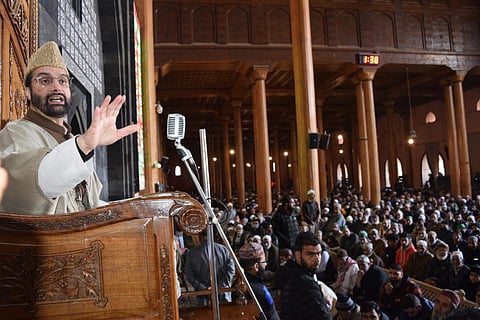

SRINAGAR: Does the release of Mirwaiz Umar Farooq, a religious leader and chairman of the All Parties Hurriyat Conference (APHC) from house arrest on March 8 mark a significant shift in Jammu and Kashmir’s recent history?
Released ahead of Ramazan – a pious month for Kashmir’s Muslim majority, he was allowed to lead the congregational Friday prayers at the historic Jamia Masjid in Srinagar’s Nowhatta. This was a significant event as the mosque had been barred from holding Friday prayers since 2019.
His statements upon his release and during the first Ramazan prayers on March 15 reflect his continued commitment to dialogue and addressing the human rights issues to resolve the challenges facing the region. He also spoke about the hardships faced by the people concerning civic issues.
Video supplied by Mirwaiz Manzil
Background of House Arrest
He was released after over four years of house detention earlier on September 22, 2023.
In his first appearance since his release, the Mirwaiz had reiterated his stand on the Jammu and Kashmir issue and said that it can only be resolved through dialogue. He emphasized, “We have always invited our Pandit brothers to return to the valley. We have always disapproved of making it a political issue. It is a human issue”.
On January 10, 2024, Mirwaiz was allowed by the authorities to travel to New Delhi. This was his first visit outside Kashmir since August 4, 2019. He returned a month later and was put under house arrest again.
First Ramazan Prayers After Release
He also made several statements regarding the release of political prisoners. He appealed for the unconditional release of thousands of Kashmiri political prisoners and youth who have been languishing in different jails across the country for a long time. He made this appeal as a gesture of goodwill on the holy month of Ramzan.
He emphasized that the conditions of many prisoners are dire and causing great distress to people.
Mirwaiz called on the authorities to listen to the voice of the people’s collective conscience. He urged them to address the issues of people, including the lack of electricity that has increased the hardships for people, especially in the holy month.
The separatist leader also said it is incumbent upon the authorities to address the issues of people, including the “lack of electricity that has increased the hardships for people, especially in the holy month” particularly for the poor who do not have alternative means.
He said authorities should address this issue at the earliest.
“The condition of roads is pathetic making commuting a nightmare,” he added.
He also appealed to all sects and organizations – religious, social, and political — to rise above personal and sectarian interests and ensure unity and brotherhood among the people to preserve and protect J&K’s collective identity.
He said the best way to ensure collectivism is by following basic human, moral and religious principles and values.
Significance of statements
These statements reflect the Mirwaiz’s continued commitment to dialogue as a means to resolve the issues facing the region. They assume greater significance amidst the sweeping censorship of dissent within Jammu and Kashmir, particularly concerning human rights and dialogue.
Does his release signify a change of heart at the Centre? Is it deemed to be a goodwill gesture ahead of Ramazan, coinciding with the announcement of general elections in India?
A day before his release, Indian Prime Minister Narendra Modi in his first-ever visit to Kashmir since the abrogation of Article 370 addressed a rally, and boasted about ushering in an era of hope, development, and peace, thus making Kashmir a pivot to the elections.
Interestingly, on March 6, the administration told the Jammu and Kashmir High Court, where the Mirwaiz had moved a plea against his continued house arrest since 2019, that he ‘was not under house arrest and was free to go wherever he wanted’.
“The petitioner has neither been detained nor has his freedom been jeopardised. The police deployment…is purely for safety and security purpose and as a preventive measure so as to foil any attempt of anti-national elements,” the counsel told the court, according to The Wire.
Referring to the assassination of Mirwaiz’s father Moulana Mohammad Farooq on May 21, 1990, the counsel told the high court that the Hurriyat leader was “advised” to restrict his movement “for some time” due to the “overall security scenario” in Srinagar after the reading down of Article 370.
“Thus, visualising the perceived threat perception of the petitioner in the set of circumstances, the agencies cannot afford to take even a slightest risk in curtailing the deployment of the security personnel,” the counsel said.
They added: “The threat perception of the petitioner cannot be ruled out under any circumstance which makes it expedient to deploy police contingents outside his house.”
The counsel also informed the court that Mirwaiz was “advised not to visit public and large gatherings which was in his own interest and also in compliance to SOP regarding COVID-19” following the outbreak of COVID-19 pandemic in 2020.
—–
Have you liked the news article?